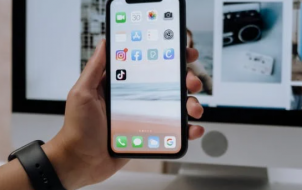TikTok recently changed the font on their app. While not drastically different, a lot of users are unhappy with the change and want the old font back. In a blog post, TikTok explained the reason behind the change, “TikTok sans, inspired by the creativity and authenticity of our global community.”
This article takes a look at the new font change and examines the reactions from the app’s many millions of users.
The Change
The previous font TikTok used was Proxima Nova-Semibold. As mentioned, the new custom font is called TikTok Sans. The change is a minor one and the only difference is that in the new font the letters are closer together and a little bit slimmer. Most users haven’t even noticed it yet, but those who have aren’t very happy with the change. For the most part, they feel that the font is harder to read.
Why the Change?
Apps like TikTok like to make small changes to keep more modern and up-to-date. They may want a new visual appeal or just to freshen things up. Like most creators, they like to explore new creative ideas. It’s also possible that the change was made based on user feedback. TikTokers may’ve expressed a wish for a different font, and TikTok listened since their success is heavily based on user satisfaction.
Why Hasn’t the Font Changed for Me?
As it’s such a subtle change, some users may not have even noticed yet. If the change hasn’t happened for you, and you want the new font, visit your app store and see if you need to update TikTok.
The following steps will help you update TikTok:
- Go to the Play Store.

- Type in TikTok.

- Click on “Update.”

- Open the app when the update is complete.
Note that this might also be a gradual change, and not be available in all regions.
TikTok Users Attack
As previously established, many TikTokers are unhappy with the new font. Many find it visually unattractive, hard to read, and want the old font back. At the time of writing, TikTok hasn’t officially acknowledged these complaints yet. But it will be interesting to see if they bow to the pressure and revert to the old font.
Twitter Reacts
Below are some of the responses from TikTok users who don’t like the font change:
“The new TikTok front makes me want to jump in front of a semi-truck.”
“Bro, I’m so sick of this ugly ahh TikTok font.”
“How do I get rid of this ugly ass TikTok font?”
“Wtf is this new TikTok font? It’s so ugly.”
On a Positive Note
Below are a few positive comments made by Twitter users.
“Once people forget TikTok’s previous typefaces existed in the first place (and they will), they’ll probably come to appreciate TikTok Sans.”
“TikTok’s new font is finally growing on me lol.”
“I love the new TikTok Sans font tbh.”
Font Changes on other Social Media Sites

Facebook used Klavika to create their logo but made some minor changes to give it the distinctive look it has now. The font they use for their text is whatever your sans-serif standard is, so it depends based on what device you are using. In 2016, Facebook changed their font for desktop users from Helvetica to Geneva. It wasn’t a huge change, but some users weren’t happy with the change, one person even saying that “the new font is just different enough to make my head and eyes hurt” and another saying, “that the new font is super ugly, and I don’t want it.”

WhatsApp is one of the most popular messaging apps right now. This app is different from most others because you can actually change the font on your text format. The Typewriter font is the most favorable amongst users.
Changing the font is easy, all you have to do is use the ` symbol three times on either side of the word. For example, “`surprise.“` Don’t confuse the ‘ for the `. You can find the symbol on Android and IOS keyboards.
The ` symbol is easy to find on an Android keyboard, but to find it on IOS, long press the ‘ and a number of symbols will pop up, one of them being the ` that you need to change your font in WhatsApp.

Pinterest changed their logos font in 2020 for the first time since 2010. The old font was ligature heavy and the newer font is more hard-edged. The “P” didn’t change but the rest of the word got a new wordmark. There was some controversary over this change because a mobile app called Path filed to forbid Pinterest to use the “P” because it matched theirs. To this day, both companies still share the same lettering.

Twitter changed its font in January 2023. They’re still using their own font called Chirp, but now they’re using more OpenType stylistic sets to make it easier to notice the difference between some of the characters. This change is only on Twitter handles on desktops. It doesn’t seem like people were so upset about this change and most believe the change happened so that it would be easier to spot an impersonator.
FAQs
Can I change back to the old font?
Unfortunately, no. There’s currently no way to change the setting and revert to the old font.
Can I change the font by changing my system-wide font?
No. You can’t go into settings on your devices to change the font and affect how the font appears on TikTok.
Can I customize the font on my TikTok account?
No. There’s no way to customize the font on your TikTok account as of right now.
What if I don’t want the new font?
The only thing you can do is not update to the newest version, but that could also cause problems with your ability to use certain features within the app in the future.
TikTok Font Change Sparks Backlash
TikTok is a place where people can share their talents and creativity with others. And while updates are a common occurrence on apps which users should expect, not all are happy with the changes. Unfortunately, there’s nothing you can do at present if you don’t like the new font on TikTok. You’ll just have to sit tight and hope that the platform either reverts to the old font or offers users a way to change it.
What do you think of the new TikTok font? Is the backlash warranted? Let us know in the comments section below.
Disclaimer: Some pages on this site may include an affiliate link. This does not effect our editorial in any way.











